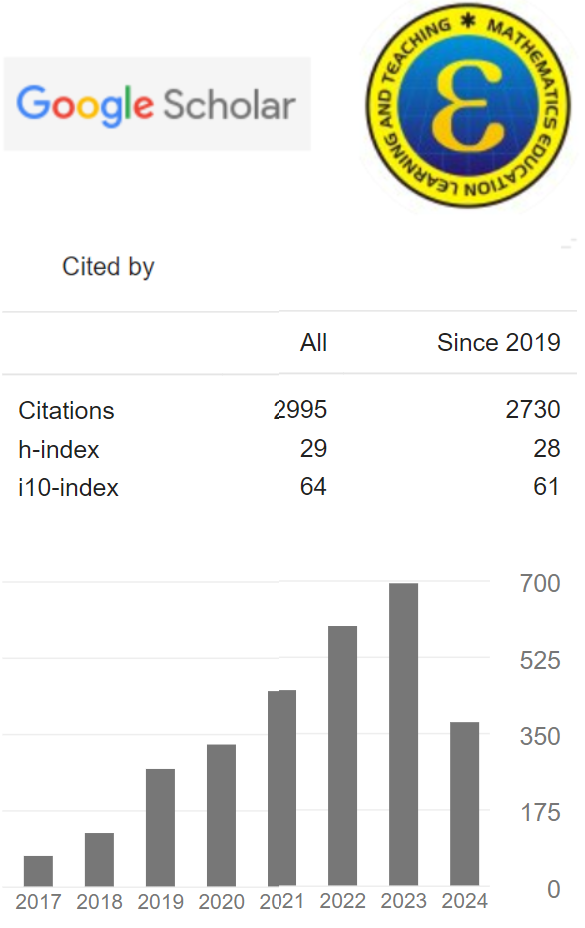Analyzing Students' Cognitive Process of Mathematical Problem Solving for Mathematical Literacy
(1) Universitas Swadaya Gunung Jati
(2) Universitas Swadaya Gunung Jati
(3) Universitas Swadaya Gunung Jati
(4) Universitas Swadaya Gunung Jati
(5) Universitas Swadaya Gunung Jati
(6) Universitas Swadaya Gunung Jati
(*) Corresponding Author
Abstract
Keywords
Full Text:
PDFReferences
Ahyar, H., Andriani, H., & Sukmana, D. J. (2020). Buku Metode Penelitian Kualitatif & Kuantitatif (Issue March). CV. Pustaka Ilmu.
Anggraini, K. E., & Setianingsih, R. (2022). Analisis kemampuan numerasi siswa sma dalam menyelesaikan soal asesmen kompetensi minimum (AKM). MATHEdunesa, 11(3), 837–849. https://doi.org/10.26740/mathedunesa.v11n3.p837-849
Arikunto, S. (2010). Prosedur penelitian suatu pendekatan praktek. Pustaka Pelajar.
Ayuningtyas, N. (2013). Proses penyelesaian soal higher order thinking materi aljabar siswa SMP ditinjau berdasarkan kemampuan matematika siswa. Mathedunesa, 2(2). https://doi.org/10.26740/mathedunesa.v2n2.p%25p
Azwar, S. (2012). Penyusunan skala psikologi (2nd). Yogyakarta: Pustaka Pelajar.
Azzahra, R. H., & Pujiastuti, H. (2020). Analisis kemampuan pemecahan masalah siswa pada materi sistem persamaan linear tiga variabel. Transformasi: Jurnal Pendidikan Matematika Dan Matematika, 4(1), 153–162. https://doi.org/10.36526/tr.v4i1.876
Booth, J. L., Lange, K. E., Koedinger, K. R., & Newton, K. J. (2013). Using example problems to improve student learning in algebra: Differentiating between correct and incorrect examples. Learning and Instruction, 25, 24–34. https://psycnet.apa.org/doi/10.1016/j.learninstruc.2012.11.002
Burton, L. (1984). Mathematical thinking: The struggle for meaning. Journal for Research in Mathematics Education, 15(1), 35–49. https://doi.org/10.2307/748986
Candrama, M. M. T., Darmawan, P., & Basri, H. (2023). Berpikir Siswa SMA dalam Memecahkan Masalah AKM Numerasi Bangun Ruang Sisi Lengkung Berdasarkan Teori Dual-Process. Jurnal Riset Pendidikan Dan Inovasi Pembelajaran Matematika (JRPIPM), 7(1), 1–25. https://doi.org/10.26740/jrpipm.v7n1.p1-25
Fani, F. L., Mariani, S., & Agoestanto, A. (2023). Problem Based Learning (PBL) with Scaffolding Approach to Improve Students’ Mathematical Literacy. EduMa: Mathematics Education Learning and Teachingâ€â€â€Ž, 12(2), 235–247. http://dx.doi.org/10.24235/eduma.v12i2.14117
Ferdianto, F., Sukestiyarno, Y. L., & Widowati, I. J. (2022). Mathematical Thinking Process On Numeracy Literacy Problems For Middle School Students. Journal of Positive School Psychology, 6(8), 6909–6923. Retrieved from https://journalppw.com/index.php/jpsp/article/view/11007
Fouze, A. Q., & Amit, M. (2017). Development of mathematical thinking through integration of ethnomathematic folklore game in math instruction. Eurasia Journal of Mathematics, Science and Technology Education, 14(2), 617–630. https://10.12973/ejmste/80626
Hasanah, S. I., Tafrilyanto, C. F., & Aini, Y. (2019). Mathematical Reasoning: The characteristics of students’ mathematical abilities in problem solving. Journal of Physics: Conference Series, 1188(1), 12057. https://ui.adsabs.harvard.edu/link_gateway/2019JPhCS1188a2057I/doi:10.1088/1742-6596/1188/1/012057
Hayati, T. R., & Kamid, K. (2019). Analysis of mathematical literacy processes in high school students. International Journal of Trends in Mathematics Education Research, 2(3), 116–119. https://doi.org/10.33122/ijtmer.v2i3.70
Lerman, S. (2020). Encyclopedia of mathematics education. Springer.
Liu, Y., & Ginther, D. (1999). Cognitive styles and distance education. Online Journal of Distance Learning Administration, 2(3), 1–17.
Maslihah, S., Waluya, S. B., & Suyitno, A. (2020). The role of mathematical literacy to improve high order thinking skills. Journal of Physics: Conference Series, 1539(1), 12085. https://ui.adsabs.harvard.edu/link_gateway/2020JPhCS1539a2085M/doi:10.1088/1742-6596/1539/1/012085
Miftah, R., Herman, T., & Kurniawat, L. (2021). Students’thinking Process in Solving Mathematical Literacy Problem Based on Cognitive Style.
Muhtadin, A. (2020). Defragmenting Struktur Berpikir Melalui Refleksi untuk Memperbaiki Kesalahan Siswa Menyelesaikan Soal Cerita. Primatika: Jurnal Pendidikan Matematika, 9(1), 25–34. https://doi.org/10.30872/primatika.v9i1.248
Oljayevna, O., & Shavkatovna, S. (2020). The Development of Logical Thinking of Primary School Students in Mathematics. European Journal of Research and Reflection in Educational Sciences, 8(2), 235–239.
Owusu, A. (2023). Problem Based Learning: Errors Minimization, Conceptual and Procedural Understanding in Trigonometry. African Journal of Educational Studies in Mathematics and Sciences, 19(1), 1–18. Retrieved from https://journals.uew.edu.gh/index.php/ajesms/article/view/199
Rahmatiya, R., & Miatun, A. (2020). Analisis kemampuan pemecahan masalah matematis ditinjau dari resiliensi matematis siswa SMP. Teorema: Teori Dan Riset Matematika, 5(2), 187–202. http://dx.doi.org/10.25157/teorema.v5i2.3619
Sari, R. H. N., & Wijaya, A. (2017). Mathematical literacy of senior high school students in Yogyakarta. Jurnal Riset Pendidikan Matematika, 4(1), 100–107. http://dx.doi.org/10.21831/jrpm.v4i1.10649
Stacey, K. (2006). What is mathematical thinking and why is it important. Progress Report of the APEC Project: Collaborative Studies on Innovations for Teaching and Learning Mathematics in Different Cultures (II)—Lesson Study Focusing on Mathematical Thinking.
Stacey, K., Burton, L., & Mason, J. (1982). Thinking mathematically. Addison-Wesley.
Sugiyono. (2016). Metode Penelitian Kuantitatif Kualitatif dan R&D. Bandung: Alfabeta.
Sukmawati, S., Saumi, T. F., & Nasrullah, A. (2020). Camtasia-assisted computer statistics application practicum learning video in online classes to improve students’ mathematical understanding. Journal of Physics: Conference Series, 1657(1), 12016. http://dx.doi.org/10.1088/1742-6596/1657/1/012016
Supiarmo, M. G., Mardhiyatirrahmah, L., & Turmudi, T. (2021). Pemberian scaffolding untuk memperbaiki proses berpikir komputasional siswa dalam memecahkan masalah matematika. Jurnal Cendekia: Jurnal Pendidikan Matematika, 5(1), 368–382. https://doi.org/10.31004/cendekia.v5i1.516
Tabun, H. M., Taneo, P. N. L., & Daniel, F. (2020). The Ability of Student Math Literation on Problem Based Learning Model. EduMa: Mathematics Education Learning and Teachingâ€â€â€Ž, 9(1), 43–48. http://dx.doi.org/10.24235/eduma.v9i1.6036
Wulandari, S., Sari, C. K., Nurcahyo, A., & Setyaningsih, R. (2023). Literasi Matematika Siswa dalam Memecahkan Masalah Hots. JPMI (Jurnal Pembelajaran Matematika Inovatif), 6(3), 1033–1044. https://doi.org/10.22460/jpmi.v6i3.17581
DOI: 10.24235/eduma.v13i1.16272
Article Metrics
Abstract view : 54 timesPDF - 7 times
Refbacks
- There are currently no refbacks.
Copyright (c) 2024 EduMa: Mathematics education learning and teachingâ€â€â€Ž


.png)










